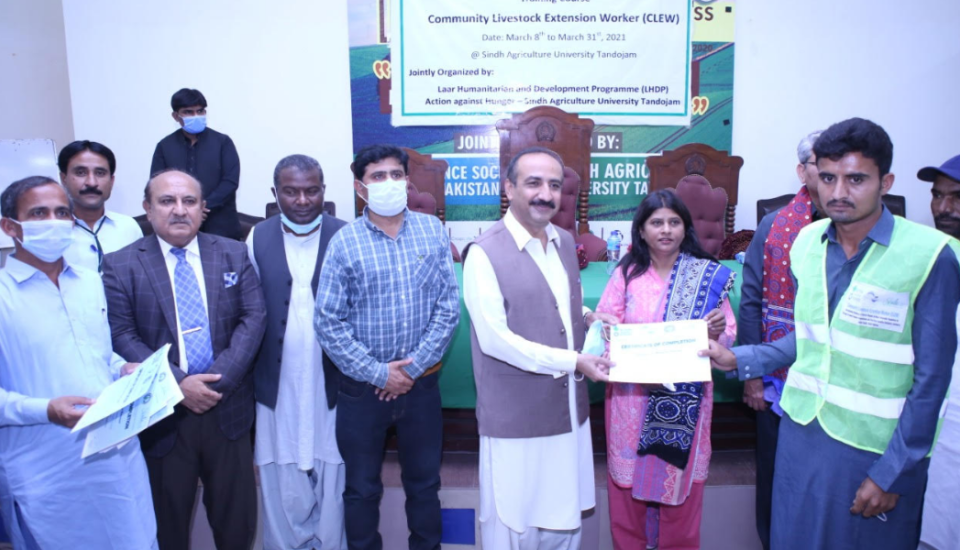By: Sawan Khaskheli
TANDOJAM: The livestock and agriculture both are backbone of the rural economy, both needed support to end poverty. Livestock is important asset for the poor farmers of rural area district Badin.
These views were expressed by Senator Krishna Kumari while chairing the conclusion event of “One month training of Community Livestock Exentsion Workers (CLEWs)” jointly organized by Laar Humanitarian Development Programme (LHDP), Action Against Hunger (ACF) and Sindh Agriculture University (SAU) Tandojam, held at the university premises on Wednesday which was attracted by large number of CLEWs, Government officials and LHDP representatives.
Senator Krishna Kumari expressed that Livestock is important asset for the poor farmers. In case of loss of these animals due to disasters or visible threats by natural calamities they cannot tolerate adding she hope when these workers move back to their native areas they will help people to save their assets.
She appreciated the CLEWs for gaining successful training course to help people in their areas where they belong to. She also lauded the role of SAU for strengthening coordination with the rural communities, offering opportunities to have source of living on the basis of such short-term courses.
Ms. Kumari said that for poor communities a single goat has a great value as the farmers live sustainably in difficult times. Herder families in disaster-prone Badin district keeping two-three goats each can better describe the importance of these traditional assets, she added.
She hoped these trained CLEWs would extend helping hand to save livestock in Badin district, which is experiencing drought, sea intrusion, losing underground water and facing water scarcity for irrigation purposes.
SAU-Vice Chancellor Dr. Fatah Mari in his concluding remarks asked community livestock extension workers to take responsibility and play effective role to save animals in their areas. He said the livestock farmers need help to cure their animals at the time when the sea has already ruined fertile lands, destroying grazing fields and poor farmers wanted to save their assets because of seasonally diseases and viruses.
Mari said “we can reduce poverty together. We can extend help to improve livestock productivity so the people may live sustainably”. He said there are indigenous breeds which can give more milk but there is need to create awareness among farmers for the cause.
The VC said skills are important for CLEWs who hail from remote areas and seem ready to offer voluntarily services.
She said Sindh Government is working to promote agriculture and related livestock sector, as these both sectors provide livelihood for the majority of rural people.
Iqbal Haider, Executive Director LHDP urged the CLEWs that you have voluntarily offered to support the drought affected farmers after gaining training.
He said 40 trained CLEWs have got successful training for one month and got important tool kits with equipment and medicines including knowledge, which may help you to detect diseases and provide medicines instantly.
He expressed the hope that these workers will turn helpful for the farmer families. He said majority of community women play a leading role to keep small animals for feeding their kids.
Badin district reportedly possesses 2.8 million livestock population, both big and small animals, which provide source of livelihood to the rural families, he added.
Prof Muhammad Ismail Kumbhar expressed the hope that these workers may have capacity to launch their own veterinary clinics at their villages to earn income. Furthermore, he said government’s livestock department has trained people to help them in vaccination drives in seasons.
Zahoor Palijo, representative of Action Against Hunger (ACF) said these people have been given required tool kits for running veterinary clinics.
He also shared their interventions like drought resilient and saline agriculture in different area, which are helping farmers to use their land for productivity through this mode of cultivation.
He said there are some crop varieties, which can be cultivated in saline areas. Farmers must take initiatives to produce saline-resistant crops.
It is pertinent to mention that 40-member group of CLEWs from 30 drought affected revenue villages of district Badin received training course in diagnosing and treatment of animals at the agriculture university by qualified experts. They demonstrated to provide support to drought-affected livestock farmers.
In the end these CLEWs got tool kits, which carry useful equipment and medicines free of cost. They will get further support to launch their own veterinary clinics in their areas.

